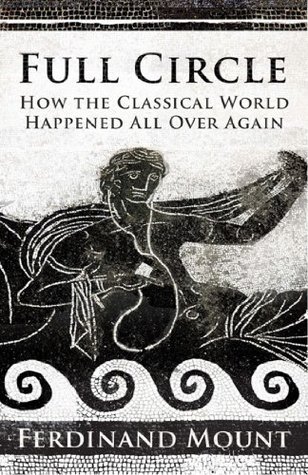by Ferdinand Mount, published by Simon & Schuster 2010, in paperback April 2011
There’s a brilliant new idea on every page of Ferdinand Mount’s meandering, fascinating comparison of various aspects of the modern world with those of Classical times. And like all good original thinking, when so well expressed, the ideas seem obvious after the event: similarities between Roman bath culture and modern spa-going, between ancient gyms and the modern worked-out body beautiful, between stuffed dormice and modern foodyism, even between the pre-Christian Eastern mystery religions of the Roman Empire and, well, the post-Christian Eastern mystery religions of the Western world.

And many of the ideas merit a book in themselves: for example, I was not familiar with Vaihinger’s post-Kantian arguments for ‘as-if’ Christianity (it’s not true but you’ll have a nicer time if you behave as if it was), an interesting idea which we will hear more of as the arguments of what Mount calls the ‘anti-God botherers’ (Dawkins and his fellow-travellers) rumble on.
It is probably a relief that he ducks the issue of slavery altogether. You do not have to be a Hegelian Marxist to realise that some ancients could be pretty free to do all sorts of things because many had no freedom at all. Nor a Christian fundamentalist to appreciate that Christianity with its then new idea of the equality of souls spelled the decline and eventual abolition of ancient world slavery. But comparisons between ancient world slavery and modern world “globalisation’ made elsewhere are wrong, even though the benefits of free trade are indeed one of the reasons why the western world does again have a substantial middle class, free to hang around in gyms, spas and restaurants and rediscover all the 2,000-year-old pleasures Mount so wittily describes.
And he does bang on about sex. I am not sure how interesting a point it is that the ancients were promiscuous and that so are many in the 21st-century West. Much more fun on the subject (and not much to do with the ancient world) is Mount’s account of the evolution of ideas about sex in the 20th century, particularly the tediousness of the Bloomsbury group’s infantile musings on the subject, which they thought so grown-up compared to those of the straight-laced Victorians to whom they felt so eminently superior. I think Mount’s point is that the conclusion of the attempt to glorify copulation, with its apogee in the sexual “revolution” of the 1960s, succeeded, by its ubiquity, only in trivialising it. Back to where it was in ancient times.
Extracting unified themes from the thousand years of rapid intellectual experiment and development from the rise of Athens to the fall of Rome, and comparing those themes to those of our own day is not always easy. For example, while Mount does find a Greek philosopher with some remarkably Popperian ideas about scientific discovery, it is not clear that Romans, never seriously interested in new inventions or in the advance of science, really had much in common with the 21st century in terms of scientific attitudes.
But these are quibbles. As I say, brilliant, a fascinating idea on every page. Here I have covered about one and a half ideas inadequately; he has 385 pages of them. I think I will read it again.
Reviewed by Tom Brompton
Blue Guides publish Sites of Antiquity: from Ancient Egypt to the Fall of Rome, 50 Sites that Explain the Classical World.






